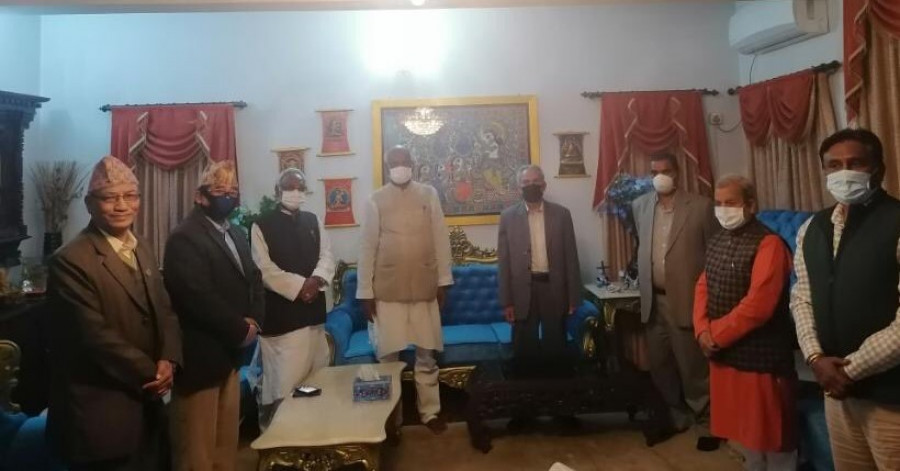Politics
Janata Samajbadi Party reiterates demand for constitutional amendment to incorporate concerns of Madhesi community
As the government prepares to revise the constitution to legitimise new map, Samajbadi leaders tell the Business Advisory Committee of Parliament that it’s also an ‘opportune’ moment to address their concerns.
Binod Ghimre
As the law minister and the Speaker of the House have both sought unanimous passage of the proposed amendment to the constitution, the Madhes-based parties have asked that the amendment incorporate their demands too.
The government has tabled a proposal aimed at amending Schedule 3 of the constitution, which includes reference to the national coat-of-arms. With the introduction of a new political map of Nepal that includes all disputed territories, including Limpiyadhura, Lipulekh and Kalapani, the image of the map on the coat-of-arms too needs to be amended.
The Samajbadi Party Nepal and the Rastriya Janata Party Nepal, which recently announced a merger to form the Janata Samajbadi Party, have asked that their demands for amendments to the constitution, which have long been a bone of contention between the two parties and the KP Sharma Oli government, be included in the amendment bill.
In response to the request of the Minister for Law, Justice and Parliamentary Affairs Shiva Maya Tumbahamphe and Speaker Agni Sapkota to have unanimous position on the amendment, they said their concerns also need to be addressed while revising the statute to adjust the national map.
“We agree that all parties must have a common view on the amendment,” Laxman Lal Karna, chief whip of the Janata Party, said at a Sunday meeting of the Parliamentary Business Advisory Committee. “However, we also want our concerns to be addressed through the amendment.”
Since the amendment concerns a matter of national importance, Law Minister Shiva Maya Tumbahangphe and House Speaker Agni Sapkota had both requested all parties to pass the amendment unanimously. According to Roj Nath Pandey, spokesperson of the federal parliament, Sapkota said that he was ready to take the initiative to bring all the parties together in this matter.
“It would be best to have a common position among all the parties on the amendment,” Pandey quoted Sapkota as saying at the Business Advisory Committee meeting.
Tumbahangphe too said that she was in favour of consensus on the issue and assured of reporting the same to Prime Minister Oli.
Karna and Uma Shankar Argariya, chief whip of the Samajbadi Party, had then asked that this was an opportune moment to address their long outstanding demands. The two Madhes-based parties have long demanded that the constitution be amended to redraw provincial boundaries, recognise regional languages, address issues related to citizenship, and expand representation in the National Assembly.
Karna and Argariya have asked for an all-party meeting before the amendment bill is tabled.
Leaders of the two parties, on Saturday, had met primary opposition leader Sher Bahadur Deuba of Nepali Congress, asking for support in addressing their concerns. They also plan to meet ruling party leaders Pushpa Kamal Dahal, Madhav Kumar Nepal and Jhalanath Khanal.
The government had registered the amendment proposal in the federal parliament on Friday. It takes five-days for a bill registered by the government to mature before it is presented in Parliament, according to House regulations. The next meeting of the House has been called for Tuesday, which is when the amendment bill is expected to be presented.
Pandey said the bill would be presented in the House on Tuesday either by suspending the provision that requires five days for maturity or at the next meeting once the maturity period completes. The bill will then be published publicly to inform the general public, as per Article 274 (3) of the Constitution of Nepal.
“The endorsement process will begin only seven days after the bill is published publicly,” Gopal Nath Yogi, secretary at the parliament secretariat, told the Post.
The bill will be forwarded to the National Assembly after endorsement by the House of Representatives.
According to Article 274 (8) of the constitution, the amendment bill must be passed by at least a two-thirds majority of members of both Houses of the federal parliament.
While the ruling Nepal Communist Party falls 10 votes short of a two-thirds majority in the House of Representatives, the bill is likely to pass as all opposition parties, including the Nepali Congress and the two Madhes-based parties, are with the government on the map, citing it as a matter of “national importance”. In the National Assembly, the ruling party commands the required numbers.
Constitutional experts say that the bill needs to be endorsed first by the Lower House, where the bill originated, and then has to be endorsed by the other Upper House separately. This is the second constitutional amendment bill registered in the House of Representatives.
“It is international practice in a bicameral parliament that the constitution amendment bill has to be endorsed by both the Houses,” senior advocate Chandra Kanta Gyawali, who specialises in constitutional law, told the Post.
Baburam Bhattarai, a Samajbadi Party leader and former prime minister, had told the Post on Saturday that although they had no disputes on an issue of national interest, the amendment was a good opportunity “to build trust among all the parties.”
“We can form a common understanding on all issues, including those raised by the Madhesis, Janajatis and Tharus,” said Bhattarai.




 17.12°C Kathmandu
17.12°C Kathmandu















